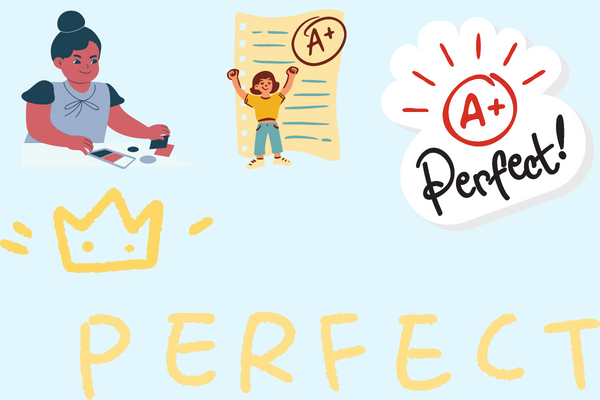Perfectionism: A Shield for Shame
By Shannan Blum, LMFT
Introduction
Hey there friend, are you ready to dive into the wild world of perfectionism? While achievement was definitely a way in which I received attention, praise and validation growing up, it provided other challenges for me. Don’t get me wrong, it absolutely felt good in the moment, but that validation wasn’t for who I was, rather for what I did. That, folks, is a dangerous slope. In one sense, it gave me a shield for the shame and rejection I believed was sure to come if others saw my failures. But the nasty flip side is it proved problematic for years to come, because of course, that quest of ‘perfect’ is endless and empty.
Shame & Perfectionism
This ‘shield for shame,’ is the foundation of perfectionism as it provides that illusion of protection against the big, bad beast called rejection. But here’s the catch – it’s actually all just smoke and mirrors! Buckle up for his ride, friends, because I’m introducing the mind-benging reality that perfectionism a cheap counterfeit that leaves us feeling disconnected and dishonest. As Brene’ Brown’s research shows us from The Gifts of Imperfection, here’s what perfectionism really is:
- A defense that ‘looks like I’m striving for excellence’ but truthfully guards against the idea “Without all that effort, if I’m seen for who I am – I will be deemed unworthy of love and rejected.” SHAME.
- Earning approval through achievement – “I aim to please, perform, perfect, or prove myself” in order to ‘fit in’ rather than ‘belong.’
- Increases fears of failure, making mistakes or receiving any criticism.
- Correlated to higher rates of depression, anxiety & addiction.
- Relies on shame, endorses shame and fuels shame.
The problem with perfection, is it’s ‘BIG LIE’: “this striving for excellence helps me become the best version of myself and then others will love me and accept me.” Harsh truth: it doesn’t and they won’t. Because perfectionism relies on presenting a false “perfect” self to escape rejection, it’s inherently dishonest. And that…is the hustle. It’s a cheap counterfeit trying to assure you that somehow you won’t survive rejection, so you have to lie. I mean, of course rejection sucks and sure, it hurts. But what an outrageous sellout of your strength and resiliency perfectionism sells you! It’s like Jack Nicholson screaming at Tom Cruise in A Few Good Men, “You can’t handle the truth!” Well, actually, the truth is, you are capable enough to handle the distress, and use skills to manage it. So, you don’t have to lie and ‘be perfect’ to escape it.
Instead of truly protecting you and helping you avoid rejection, this dishonesty prevents the authentic connection you crave with others and what you really get is chronic emptiness, poor self-worth, depression, and anxiety. Not a great deal. The irony here, friends, is that perfectionism endorses more feelings of shame, not less, and then reinforces more ‘trying to be perfect.’ So, the cycle of madness just continues.
More Research
In case you think I’m just blowin’ sunshine up your behind….Research shows that perfectionism is primarily an emotion regulation issue, and this, we know, is similar to procrastination. Dr. Pychyl’s (2016) research at Carleton University’s Psychology Department demonstrates the link between dysregulated emotions and avoiding tasks linked to these emotions. C. Juliana (et al., 2016) published research with similar results linking emotional dysregulation and poor coping skills associated with perfectionism. So, the antidote to the “perfectionism madness” then is to start stacking up those emotion regulation skills (rather than more ‘striving’).
What to do Instead?
Challenging perfectionism involves increasing mindfulness/compassion, affirmations & whole-self acceptance, relationship/connections, and setting SMART goals. Getting out of the Shame-Game of Perfectionism is about:
- Increasing mindfulness, living in the present moment
- Increasing kind, affirmative language to yourself (aka Self-Compassion)
- Decreasing ‘the hustle’ behavior and those who support it in your life
- View productive struggles as a pathway for new learning and building resiliency
- Supporting genuine self-improvement aligned with your values
- Using SMART or WOOP Goals to learn new skills and hobbies, take appropriate rests and breaks
- Celebrating your wins and those of others around you
- Obtain support and guidance as needed
Conclusion
So take a breath, enjoy the ride, and embrace the beautifully flawed individuals we all are. Feel free to share this blog with anyone who needs a reality check on perfectionism or just save it for when you need some bestie-reinforcements. I gotch
If you are interested in learning how to navigate the treacherous waters of shame and embrace your authentic self, take a peek at my Kairos Transformation coaching services here.
Resources
Brown, B. (2010). Gifts of imperfection, The: Hazelden Information & Educational Services.
Flett, A., Haghbin, M., & Pychyl, T.A. (2016). Procrastination and depression from a cognitive perspective: An exploration of the associations among procrastinatory automatic thoughts, rumination, and mindfulness. Journal of Rational-Emotive and Cognitive-Behavioural Therapy, 1-18 DOI 10.1007/s10942-016-0235-1
Juliana, C., Soares, M., Pereira, A., & Macedo, A. (2016). Perfectionism, cognitive emotion regulation and perceived distress/coping. European Psychiatry, 33(S1), S213-S213. doi:10.1016/j.eurpsy.2016.01.513
www.procrastination.ca/who-we-are


0 Comments